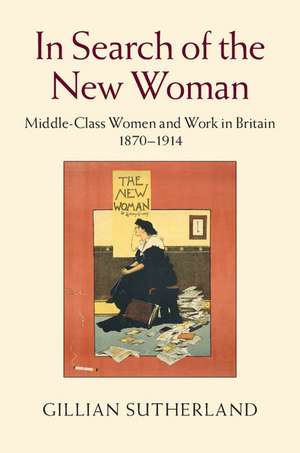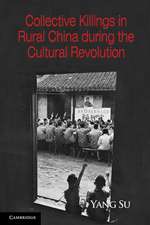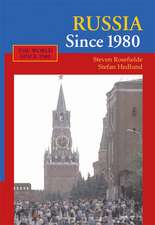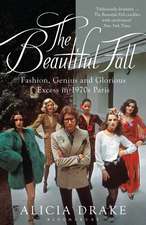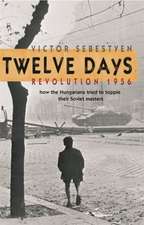In Search of the New Woman: Middle-Class Women and Work in Britain 1870–1914
Autor Gillian Sutherlanden Limba Engleză Hardback – 18 feb 2015
| Toate formatele și edițiile | Preț | Express |
|---|---|---|
| Paperback (1) | 280.15 lei 43-57 zile | |
| Cambridge University Press – 28 noi 2018 | 280.15 lei 43-57 zile | |
| Hardback (1) | 693.36 lei 43-57 zile | |
| Cambridge University Press – 18 feb 2015 | 693.36 lei 43-57 zile |
Preț: 693.36 lei
Preț vechi: 779.06 lei
-11% Nou
Puncte Express: 1040
Preț estimativ în valută:
132.72€ • 144.21$ • 111.55£
132.72€ • 144.21$ • 111.55£
Carte tipărită la comandă
Livrare economică 21 aprilie-05 mai
Preluare comenzi: 021 569.72.76
Specificații
ISBN-13: 9781107092792
ISBN-10: 1107092795
Pagini: 200
Ilustrații: 11 b/w illus. 2 tables
Dimensiuni: 162 x 235 x 14 mm
Greutate: 0.5 kg
Editura: Cambridge University Press
Colecția Cambridge University Press
Locul publicării:New York, United States
ISBN-10: 1107092795
Pagini: 200
Ilustrații: 11 b/w illus. 2 tables
Dimensiuni: 162 x 235 x 14 mm
Greutate: 0.5 kg
Editura: Cambridge University Press
Colecția Cambridge University Press
Locul publicării:New York, United States
Cuprins
1. 'A sort of bogey whom no-one has ever seen'? The nature of the search; 2. 'All that she sees before her … is teaching': formal schooling and its opportunities; 3. 'The exercise of what may be termed her maternal faculties': public service and 'caring' occupations; 4. 'Impossible for a lady to remain a lady': art, literature and the theatre; 5. 'The real social divide existed between those who … dirtied hands and face and those who did not': women white collar workers (I); 6. 'A beggarly makeshift, but for me it was wealth beyond price': women white collar workers (II); 7. Ladies and women; 8. Some conclusions: degrees of freedom; Sources and select bibliography.
Recenzii
'Gillian Sutherland looks beyond the much-discussed, much-caricatured New Woman of the 1890s - dashing, daring, and scandalously experimental - to the real women of the period, and turns up the truth that most female agents of change then were clerks and especially schoolteachers. Both cultural historians and general readers will be fascinated by the stories told here, and persuaded that the media hype of periods long before our own should also be viewed with skepticism.' Rachel M. Brownstein, City University of New York
'The 'new woman' was typist, nurse, schoolteacher or actress - beneficiaries of the 1902 Education Act, advocates of social reform, economic independence and political liberty. Gillian Sutherland's fine new book argues that 'new women' were the shock troops of change in class and sexual relations and national culture in Britain in the early twentieth century.' Sally Alexander, Goldsmiths, University of London
'Gillian Sutherland's book is indispensable. This is the first book to accrue and examine a vast array of historical evidence as to the New Woman's actual existence. The results, and Sutherland's astute conclusions, will completely change the way in which we think about women in the nineteenth century.' Clare Pettitt, King's College London
'This lucidly written study blows open the late nineteenth-century journalistic cliché of the New Woman. Consistently alert to subtleties of class, agency, and respectability, Sutherland's extensive research shows the slow, rather than sensational changes that were taking place, and opens up new doors of inquiry in women's social and cultural history.' Kate Flint, University of Southern California
'The book is well written and cogently argued, employing considerable, even admirable, research. It fits - indeed, leads - in a field that has grown dramatically in historical study, especially because it repeatedly points clearly to areas of study needed to better understand women and women's work in historical context. An important contribution that should be in all libraries.' M. J. Moore, Choice
'Sutherland's innovative approach to middle- and lower-middle-class women's expanding professional prospects and shifting social and political outlooks offers a number of intriguing lines of inquiry. She explores records from technical schools, tracing the educational infrastructure that helped sustain socially aspiring women's mass entrance into clerical employment. Sutherland also devotes substantial attention to the complex expansion of state education and the generally positive opportunities this afforded female teachers.' Katie Hindmarch-Watson, Journal of Modern History
'The 'new woman' was typist, nurse, schoolteacher or actress - beneficiaries of the 1902 Education Act, advocates of social reform, economic independence and political liberty. Gillian Sutherland's fine new book argues that 'new women' were the shock troops of change in class and sexual relations and national culture in Britain in the early twentieth century.' Sally Alexander, Goldsmiths, University of London
'Gillian Sutherland's book is indispensable. This is the first book to accrue and examine a vast array of historical evidence as to the New Woman's actual existence. The results, and Sutherland's astute conclusions, will completely change the way in which we think about women in the nineteenth century.' Clare Pettitt, King's College London
'This lucidly written study blows open the late nineteenth-century journalistic cliché of the New Woman. Consistently alert to subtleties of class, agency, and respectability, Sutherland's extensive research shows the slow, rather than sensational changes that were taking place, and opens up new doors of inquiry in women's social and cultural history.' Kate Flint, University of Southern California
'The book is well written and cogently argued, employing considerable, even admirable, research. It fits - indeed, leads - in a field that has grown dramatically in historical study, especially because it repeatedly points clearly to areas of study needed to better understand women and women's work in historical context. An important contribution that should be in all libraries.' M. J. Moore, Choice
'Sutherland's innovative approach to middle- and lower-middle-class women's expanding professional prospects and shifting social and political outlooks offers a number of intriguing lines of inquiry. She explores records from technical schools, tracing the educational infrastructure that helped sustain socially aspiring women's mass entrance into clerical employment. Sutherland also devotes substantial attention to the complex expansion of state education and the generally positive opportunities this afforded female teachers.' Katie Hindmarch-Watson, Journal of Modern History
Notă biografică
Descriere
A study of the 'New Woman' phenomenon, examining whether British women really achieved the economic independence to challenge social conventions.
